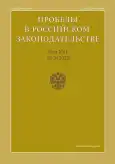Ensuring the Security of the Digital Space from Cyberterrorist Threats
- Authors: Ordokov M.K.1, Martynenko O.V.2
-
Affiliations:
- Krasnodar University of the Ministry of Internal Affairs of Russia
- Rostov Law Institute of the Ministry of Internal Affairs of the Russian Federation, Volgodonsk branch
- Issue: Vol 16, No 5 (2023)
- Pages: 156-160
- Section: General theoretical, criminal-legal and other problems of Countering extremism and terrorism. Problems of preventing extremism and terrorism
- URL: https://journals.eco-vector.com/2072-3164/article/view/568810
- EDN: https://elibrary.ru/JYRCTN
- ID: 568810
Cite item
Abstract
The purpose of this study is to study the possibilities of ensuring the security of the digital space from cyberterrorist threats.
The main feature of cybercrimes is the isolation of the criminal from the crime scene. Thus, he can be anywhere in the world, and commit a crime in another. The Internet erases boundaries and time gaps. Some scientists are of the opinion that it is possible to achieve effectiveness from international cooperation only if not individual countries, but at least all developed countries take part in it.
It is established that in order to ensure information security at the national level, it will be necessary to adopt an effective system that will make it possible to use comprehensive measures, as well as to act jointly with foreign states. The measures should be aimed at joint confrontation with terrorists. It is important that these measures allow not only to eliminate the consequences of crimes, but also to prevent them in time. This will require the systematic development and justification of methods to combat cybercrime. To protect information in cyberspace, regulation of IT networks at the state level is currently relevant. This will help to ensure high security and increase the capabilities of law enforcement agencies in the fight against cyberterrorism.
It is concluded that the Russian legislative framework regarding cybercrime is only being formed. This is due not only to the growth of cybercrime as such, but also to the fact that this phenomenon has appeared relatively recently, and the law has to make up for the difference. The social relations in which cyberspace is involved are actively developing, they are used in almost all spheres of life, which is why domestic cybercrime researchers say that accelerated development of the regulatory framework is necessary.
Full Text
About the authors
Mirzabek K. Ordokov
Krasnodar University of the Ministry of Internal Affairs of Russia
Author for correspondence.
Email: mirzabek0007@mail.ru
Police Lieutenant Colonel, Senior lecturer of the Department, North Caucasus Institute for Advanced Studies (branch)
Russian Federation, Nalchik, KBROleg V. Martynenko
Rostov Law Institute of the Ministry of Internal Affairs of the Russian Federation, Volgodonsk branch
Email: alih_88@mail.ru
Police Major, Senior lecturer of the Department
Russian Federation, VolgodonskReferences
- Aripshev A.M. Modern problems of cyberterrorism and current methods of combating crimes in the field of IT technologies during the COVID-19 pandemic // Eurasian Legal Journal. 2021. No. 9 (160). pp. 284-285.
- Zhukov A.Z. Improvement of tools for countering cyberterrorism in modern conditions // Gaps in Russian legislation. 2021. Vol. 14. No. 5. pp. 123-128.
- Kobets P.N. Improving counteraction to modern challenges and threats in the field of information security of the Russian Federation emanating from international terrorist organizations //Bulletin of the East Siberian Institute of the Ministry of Internal Affairs of Russia. 2022. No. 2 (101). pp. 51-64.
- Kostin A.V. Countering information terrorism: history and modernity // Bulletin of the Russian New University. Series: Man and Society. 2020. No. 1. pp. 104-114.
- Phitikov R.B. The development of cyberterrorism in the global information space // Law and Management. 2023. No. 2. pp. 151-154.
- Romanovsky V.G. Information security and counteraction to terrorism in the digital space // Bulletin of the Ural Law Institute of the Ministry of Internal Affairs of Russia. 2022. No. 2 (34). pp. 134-140.
- Khamurzov A.T. Cyberterrorism: new challenges and counteraction measures // Journal of Applied Research. 2021. No. 3-2. pp. 74-77.
- Kharaev A.A. On countering the legalization (laundering) of proceeds from crime as one of the main sources of terrorist financing // Eurasian Legal Journal. 2019. No. 12 (139). pp. 360-362.
- Khachidogov R.A. Cyberterrorism in the global information space: new challenges and counteraction measures // Education and Law. 2021. No. 6. pp. 362-366.
- Shirinova A.A., Sementsova I.A. Cyberterrorism as a disease of the modern Internet network. Ways to counteract // In the collection: Criminal legislation of Russia: the main problems of application and areas of improvement. Collection of materials of the I International Scientific and Practical Conference. 2019. pp. 19-21.
- Shogenov Z.A. Development of cyberterrorism in the global information space // Law and Management. 2023. No. 2. pp. 155-159.
Supplementary files











